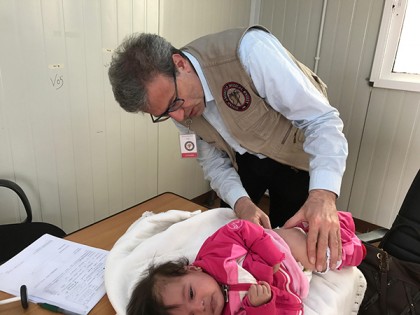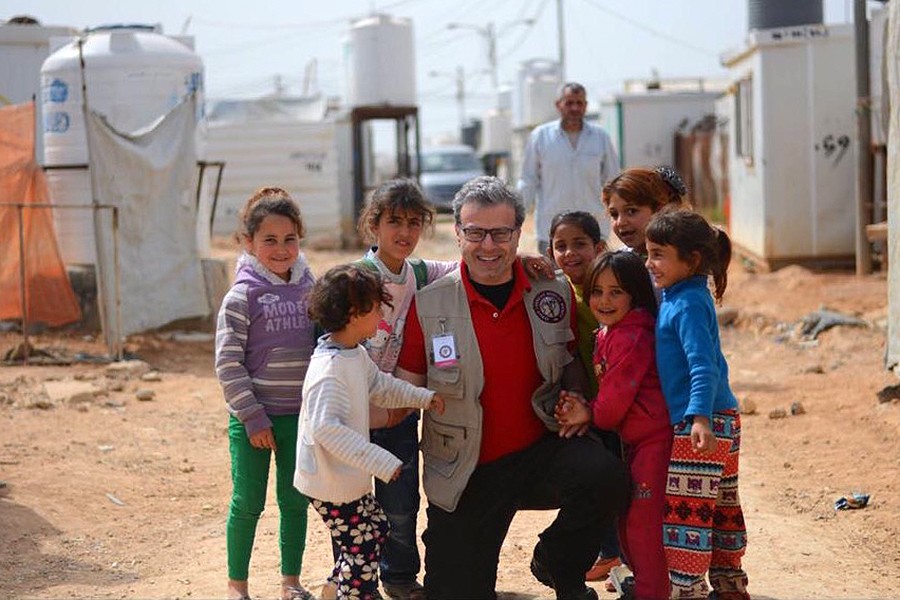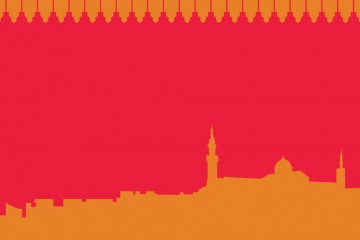Most Saturday mornings, from his apartment in Jackson, Mississippi, pediatric neurologist Tarif Bakdash sits down at his computer for a remote conference with faculty at Syria's Free Aleppo University Medical School. His counterparts are in hidden locations around liberated Syria, often literally underground. The class sometimes needs to be canceled because of a bombing.
The subject is curriculum development, which may sound implausible, even absurd, in the middle of a horrifyingly brutal civil war. That's certainly how it sounded when Bakdash first discussed the idea with faculty at Johns Hopkins, where he is enrolled in the online Master of Education in the Health Professions program. How can anyone possibly talk to people in Aleppo about evidence-based teaching when Syrian President Bashar al-Assad is dropping barrel bombs on his own people? And yet, for the anti-Assad physicians behind the new medical school, there's a desperate need to find more effective ways to prepare the next generation of medical students in a hurry, Bakdash says. What does it take to train a family physician in two years instead of five? How do you educate a nurse to think effectively in a dire emergency, often with no standard treatments available? How do you help personnel learn when there are no textbooks?
Bakdash, who now practices at the University of Mississippi Medical Center, enrolled in the Johns Hopkins program two and a half years ago. It's a collaboration among the schools of Business, Education, Medicine, Nursing, and Public Health aimed at improving education in medicine. He focuses on curriculum development, which gets scant attention, he says, even in the United States. "You start your residency and you shadow an attending physician, and you supposedly learn by diffusion and osmosis," he says.
A more useful approach, suggests Bakdash, is to limit the PowerPoint talk to a brief review of the basics—also covered in the reading the resident has completed beforehand—then actively engage the learner in diagnosing and treating four or five cases of the condition. "We're not just filling an empty vessel," says Bakdash, 52. "We take knowledge, and we play with it in our minds and are changed by it."

Image caption: Tarif Bakdash, an MEHP candidate, examines a child with an abnormal spine in a refugee camp in Amman, Jordan, where the population is 35,000
Bakdash's frustration with the way medicine is taught has deep roots. He grew up in Damascus, where he attended the Damascus University medical school. The dominant Baath political machine had handed two-thirds of the seats in his class to party loyalists, one of them then-president Hafez al-Assad's older son, Bashar al-Assad, at the time a modest and dedicated student, who became a friend. In his 2016 book, Inside Syria—A Physician's Memoir, Bakdash writes that the prevailing academic spirit was "militant indifference." The expectation was that students would do the minimum work required and, above all, ask no questions, on pain of verbal abuse from their instructors.
After graduating in 1988, Bakdash emigrated to the United States and went on to complete multiple fellowships, board certifications, and a master's in bioethics.
Syria, however, held on to his heart. The death in 2000 of Hafez al-Assad, a brutal mass murderer, and the ascendance of Bashar, who had been a practicing ophthalmologist, gave everyone in Syria new hope. Bakdash wrote to his old classmate offering his services, and in 2003 he returned to teach at the Damascus University medical school on a salary of $150 a month. He found himself in the same auditorium where, as a student, he once heard a cardiologist end a lecture with the words, "Now, if anyone has a question, he must be a donkey."
Bakdash set out to do it differently. He assigned no textbook because that would have required authorization from the Baath Party, and instead led discussions on medical ethics: "If you work in a hospital with two respirators and have three patients who will die without use of a respirator, how will you decide which patients to save?" "If a woman is raped and has conceived, is it ethical to give her a medical abortion?" As a teacher he operated on instinct, he says, not detailed scientific knowledge about how education works. "But I had no idea about the outcome. Did I teach them the right way or the wrong way?"
Syria's fatal blend of corruption, incompetence, and indifference so frustrated Bakdash that he returned to the United States in 2010. He makes annual trips to treat patients in the refugee camps of Turkey and Jordan, but that's not enough, he says. He wants to find a program that will allow him to take what he has learned about curriculum development at Johns Hopkins and apply it in both the U.S. and the developing world.
A better way to train U.S. medical students and residents, he argues, would be to require them to work in the developing world. Ideally, he says, he would rotate one month practicing and teaching in this country with one month abroad. "Give me the power to run a program and not just send somebody abroad every six months," he says. "Let's have consultations on a daily basis." That, he says, would change thousands of lives.
Posted in Health, Politics+Society
Tagged medical school, health education











